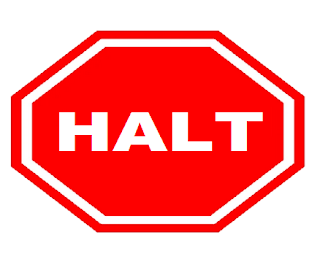
HALT is an acronym formed from the abbreviation of the words "Hungry, Angry, Lonely, Tired" and is one of a set of Cognitive Behavioural Therapy (CBT) and Dialectical Behaviour Therapy (DBT) tools used for introspection and reframing when we want to try to understand what we are feeling, why we feel that way, and how we can communicate that state to others.
When we find ourselves in a situation where we may feel irritable, or annoyed easily by others, HALT asks us to take a moment to stop and reflect and ask ourselves these four questions:
Am I hungry? When did you last eat and did that intake meet your needs or do you need to eat something else, thirst is included here as an extension of hunger.
Am I angry? Whilst anger that is reactive to immediate stimuli is often easy to identify, it is often difficult to identify undercurrents or repressed anger that stems from experiences that we are not consciously thinking about but we have not yet processed. Reflect on the day you have had and ask yourself if anything irritated you or caused you anger and whether you have confronted that emotion and acknowledged its magnitude. Acting upon anger when in an emotional state rarely leads to resolution of conflict, likewise unresolved conflict rarely leads to resolution without taking the time to process the reasons why we were angered in the first place, only by taking the time to identify and understand the stimulus can we began to formulate a strategy to minimise the influence on our lives that stimulus may have in future.
Am I lonely? As human beings no matter how extroverted or introverted we may regard ourselves, we rely on interaction with others for many different things. Emotional stimuli is not entirely within the remit of self-regulation; you will never feel the same way wrapping your arms around your body as you would from a hug from another person. The desire for connection doesn't always relate to romantic desires, nor does it have to imply a desire for constancy. Sometimes the proximity to other people is enough to feel less isolate, and less like our own existence is all that matters. External perspectives are needed to help balance our positive and negative feedback loops that otherwise risk becoming entrenched.
Am I tired? Of these four questions, this is perhaps the hardest to answer, for the simple reason that understanding tiredness first requires that we acknowledge that physical and mental exhaustion are not the same thing. Although they can occur in tandem, it is entirely possible to be physically tired but mentally wired, and vice versa. Our sleep pattern, circadian rhythm, feelings of restlessness, and insomnia are often rooted in the disparity between these two states. Understanding the physical cycle and adapting your mental behaviour to match that cycle helps develop a healthier overall relationship with sleep. This is the hardest state to assess because we often find ourselves with mental motivation and a desire to continue maintaining an active state, whilst our physical state of being has already reached the point of running on empty.
Ultimately HALT serves as a framing technique designed to make us communicate with ourselves, to analyse our state of being and be introspective. We may find that these four diagnostics do not reveal anything, that our state of being is influenced by something else, and that's okay, that is a valid conclusion to draw. However it's important to remember that as a diagnostic tool, this should not be used in a "one and done" manner, but should instead be a tool that we employ with regularity. If you use it now, and find that it does not give you an answer, don't dismiss its future utility.

No comments:
Post a Comment
All comments are moderated before they are published. If you want your comment to remain private please state that clearly.